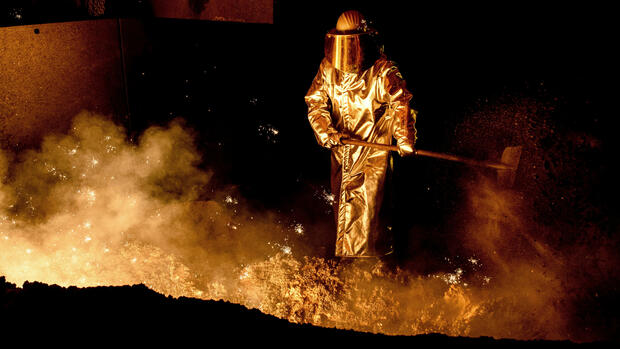In the future, the group wants to produce 2.5 million tons of steel per year in a so-called direct reduction plant.
(Photo: dpa)
Dusseldorf After a long wait, the EU Commission has given its approval for Thyssen-Krupp to receive billions in funding from the federal government and the state of North Rhine-Westphalia (NRW). This was announced by the EU Commission and the Federal Ministry of Economics on Thursday.
“This is an extremely important decision for climate protection and Germany’s industrial location,” said Federal Minister of Economics Robert Habeck (Greens). Last but not least, there are many jobs that can be made future-proof with the project.
This project will also give the hydrogen economy in Germany and Europe a further boost: “We will support further projects within the framework of the IPCEI hydrogen so that the production and transport of hydrogen is also made possible.”
The EU has been examining for two years whether the public sector can support the Essen steel group with two billion euros in the construction of a modern production plant. The approval that has now been given is not yet a final decision on funding: the federal government still has to work out its exact structure and schedule. But approval is an important step in the process.
“Our project is an important contribution to achieving the climate goals in Germany and Europe and secures sustainable industrial jobs, including in related sectors,” explained Bernhard Osburg, CEO of Thyssen-Krupp Steel, in a company statement. This is also an important step for the international perception of the steel location: “We are now relying on a timely formal approval by the federal government.”
Discrepancies lead to chaos in promotion
At the end of 2026, a so-called direct reduction plant for steel production is scheduled to go into operation and produce 2.5 million tons of steel annually – first with natural gas and then with green hydrogen, i.e. hydrogen produced by electricity from renewable sources. That would be crucial to stem the emission of climate-damaging substances. Since the Economics Ministry had agreed to start the project early, Thyssen-Krupp was able to start work at the Duisburg site.
The total cost of the project is around 2.7 billion euros, according to corporate circles. With the planned funding of up to two billion euros, the federal government is to provide aid of around 1.3 billion, the state of North Rhine-Westphalia is supporting the industrial group with funding of 700 million euros. The group itself wants to invest almost one billion euros.
>> Read also: Demand for IPO of Thyssen Krupp subsidiary exceeds the offer
The process is difficult: disagreements between Berlin, the EU Commission and Thyssen-Krupp had delayed the EU approval and thus the funding decision since 2021. While there were no more changes from the group or federal side in the case of an application from steel competitor Salzgitter AG, there was still potential for discussion on the application for support from Thyssen-Krupp, as the Handelsblatt learned from company circles.
For the group, the funding decision would mean planning security in difficult times. Thyssen-Krupp not only slipped deep into the red in the second quarter of the 2022/23 fiscal year with a loss of 223 million euros. In addition, the search for a partner for the company’s steel division, Thyssen-Krupp Steel, has been difficult for years, according to information from the Handelsblatt from corporate and financial circles. The group cannot cover the investments required for green steel production on its own.
Along with Thyssen-Krupp, Arcelor-Mittal and Saarstahl are also waiting for a funding release. All in all, it is about state subsidies of six billion euros for these three steel companies and Salzgitter.
More: New Thyssen Krupp boss is pushing for speed in the restructuring of the company.
